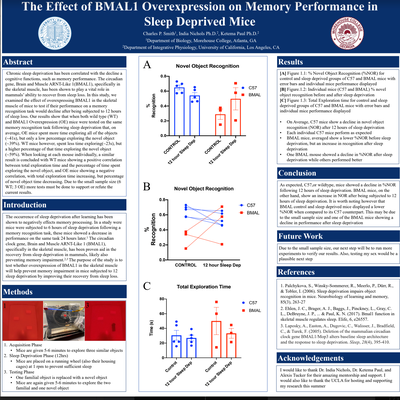
Charles P. Smith
Home Institution: Morehouse College
UCLA Mentor: Dr. Ketema Paul
Program: HBCU
Abstract:
Chronic sleep deprivation has been correlated with the decline in cognitive functions, such as memory performance. The circadian gene, Brain and Muscle ARNT-Like 1(BMAL1), specifically in the skeletal muscle, has been shown to play a vital role in mammals’ ability to recover from sleep loss1. In this study, we examined the effect of overexpressing BMAL1 in the skeletal muscle of mice to test if their performance on a memory recognition task would decline after being subjected to 12 hours of sleep loss. Our results show that when both wild type (WT) and BMAL1 Overexpression (OE) mice were tested on the same memory recognition task following sleep deprivation that, on average, OE mice spent more time exploring all of the objects (~41s), but only a low percentage exploring the novel object (~39%). WT mice however, spent less time exploring(~23s), but a higher percentage of that time exploring the novel object (~59%). When looking at each mouse individually, a similar result is concluded with WT mice showing a positive correlation between total exploration time and the percentage of time spent exploring the novel object, and OE mice showing a negative correlation, with total exploration time increasing, but percentage of novel object time decreasing. Due to the small sample size (2 WT; 3 OE) more tests must be done to support or refute the current results.

